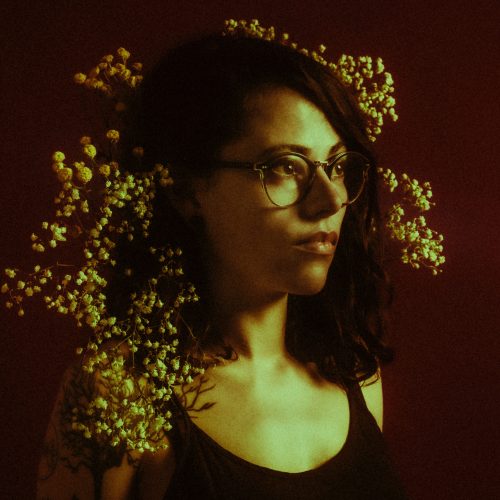Lack the Low, an experimental music project led by Kat Hunter, drenches the world in an iridescent sheen with their new song “The Sharpest Knife.” Lack the Low lives in the deliciously strange in-between, dissolving musical and artistic boundaries with sheer force of will. “The Sharpest Knife” glows in a pulsing membrane between realities: between pop and the avant-garde, between organic and synthetic aesthetics, between life and death, here and there and beyond. It lives in the borders, resisting categorization yet irresistibly drawing the listener in.
Hunter’s classical voice frames the song, twisting the soundscape into something that straddles the mainstream. But this familiarity is unsettled by dissonant drums and growling bass, tearing the song into something more restless and convulsing. The tempo shifts at unexpected moments, destabilizing the listener just as they sink into comfort. Listening to “The Sharpest Knife” feels like dilating eyes and pulsing skies, splitting pavement and flowers curling back to seeds. It feels like jolting both forward and backwards, like an almost-familiar landscape that is constantly in flux.
Lyrically, the song seems concerned with the tension between work and play. Why and how do we work – and how do we find joy within our personal and intentional labor? Hunter’s lyrics are lush and layered, and thematically reinforced by the slow rise of the soundscape. “Velvet blackness overhead, a hard road takes you to the place,” she sings. “Justice is the sharpest knife, encouragement never comes too late.”
We had the chance to talk with Lack the Low. Here’s what they had to say.
Your lyrics have a unique depth and multiplicity that breathes life into your songs. When did you start writing and do you write fiction or poetry outside of music?
That’s really kind, thank you! I started writing songs when I was about 14 years old. I never wrote fiction or poetry, and lyrics always felt like the least concrete part of the writing process. I’ve never liked to edit my words too much, so I think over time I’ve just tried to focus on getting it right the first time – just speaking as honestly as I can without self-scrutinizing too much.
What “big questions” are you concerned with on your upcoming album?
So much of God-Carrier is about what I’d call “leaning yin-wards”. It’s about getting older and being able to recognize the things that aren’t in your control, and learning to be ok with that. But it’s also about grappling with hierarchical systems that are alienating, and choosing to re-center warmth and compassion in a society that often opts to delegitimize those qualities.
What musical or lyrical themes do you find yourself grappling with, over and over again?
I think being an artist in the world we live in today exposes you to particular questions – simply through the process of continuing to practice art in a world that on the one hand doesn’t value it, and on the other, doggedly financializes it. So, one recurring theme for me has been about work, and what it means to work as an artist. How to be productive without burning out, how to make work without being too attached to the results, how to not allow narratives about work and productivity to take over. And also questions about what it might mean to feel “hopeful” when you look at the world we live in; particularly when you examine our treatment of the environment, our treatment of women, and the way we treat ourselves. I think you can find those three lenses recurring through much of my work.
What is the biggest difference between your last project and this new stage of music?
I’d say the biggest difference is in how cohesive it feels. With my last album One Eye Closed, I’d often I’d use instrumental sections and sound-design in a way that was more collage-like; combining different themes, arrangements and elements one after another to gradually build a picture. With God-Carrier, although there are still many experimental elements, there’s definitely a sense that each song is its own world and that each world fits together in a precise way. Lyrically I feel like I’m being more direct as well.
In what ways do you think this song might be universal, and in what ways is it personal?
I think when I first wrote “The Sharpest Knife” I was thinking a lot about ambition and envy, and my own experience of turning 30 (in a lockdown no less). Although I didn’t feel afraid of getting older, it seemed like an interesting time to reflect on what I’d hoped for, for myself as a 20 year old, and what I ended up with a decade later. Although sometimes painful, it was so interesting to reflect on the things that I was so sure I would achieve that I never did, and then on the other hand the absolute blessings that I never hoped for but that had seemed to just fall into my lap. I was thinking about how envy loses its texture when you realize how impossible it is to really compare your life to anyone else’s, and that at the end of the day I felt attachment to my life simply because it was mine – not necessarily because it could be judged as being good or bad, successful or not. I think figuring out how to feel about your failures and your sense of envy is the kind of uncomfortable emotional work that everyone tries to do at some point, and learning to do it with grace is a challenge that everyone faces.







